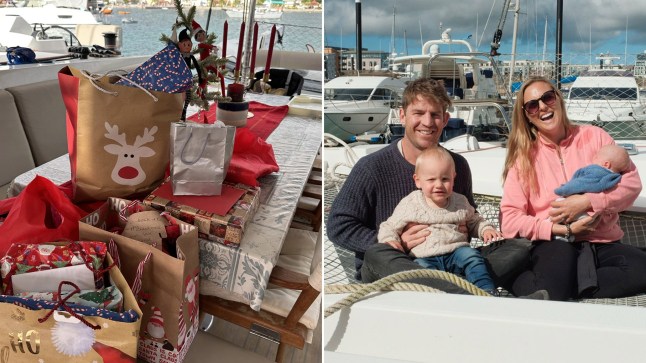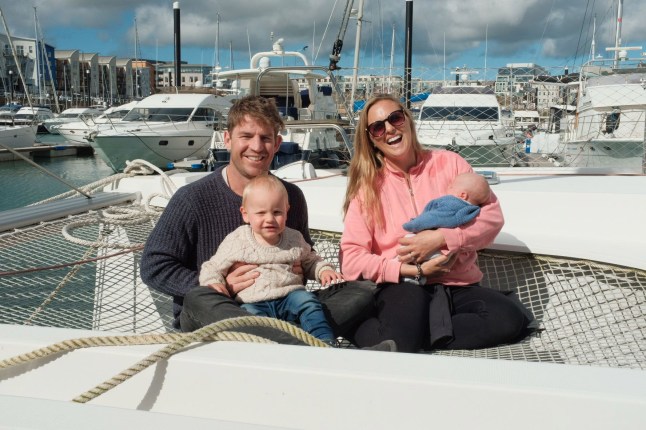
A family who permanently live on a sailboat have opened up about how they spend Christmas – and it might be more minimal than others, but it’s wholesome, nonetheless.
Stephanie and Richard Stevens live on board their beloved vessel, the Pinnacle, alongside their two children, three-year-old Jesse and one-year-old Roux.
They haven’t always spent their time sailing the seas though. They’re originally from Jersey but decided to move on board their boat a year ago to live out their days travelling.
But, having made the big transition from living in a regular home, they’ve now become much more conscious about space. And as Christmas quickly approaches, they’ve decided to do presents a little differently this year to avoid clutter.
‘Instead of [advent] chocolate, we use small surprises like stickers, sea shells, stationery and note pads,’ 35-year-old Stephanie, who makes her living as a content creator, tells What’s The Jam.


‘For presents, we keep things minimal, focusing on small, practical items or experiences.’
Since they set sail to travel, they’ve even invented new traditions: one being a simple tiny toy car. They give their children one for every country they visit, and so far, they’ve ticked 22 off the list.
‘These tiny cars bring endless joy and keep them entertained for hours. There are definitely a couple of these stored away for Christmas,’ Stephanie explains of this year’s plans.
‘If we’re expecting visitors, we plan ahead and order the items to them, so they can bring them out to us, and we can give them back to them.’
Elsewhere, clothing is similarly an essential gift, as the children are always outgrowing their old belongings.
‘Their swimmers take a beating from the sun and saltwater.


‘Christmas for us is less about the ‘stuff’ and more about creating special memories together, wherever we are in the world.’
Importantly, Stef and Rich don’t believe that their children are missing out on anything – as they’re too young to remember any different.
Jesse was only one when the family celebrated their last Christmas in Jersey, and Roux ‘has yet to experience a traditional Christmas.’
But tradition remains important to them, and as Stef says, they do their best to ‘keep family traditions alive, no matter where we are.’ These include baking Christmas biscuits, putting up a tree (even if it’s only a tiny one), listening to Christmas songs, and reading festive stories together.
‘These simple rituals keep the holiday spirit strong onboard,’ she notes.
Their Christmas lunch might be a ‘bit unconventional,’ but it suits their lifestyle. On the big day, they enjoy a BBQed surf and turf with freshly caught fish, and ‘whatever local fruits and vegetables’ the family can find in their local supermarket – wherever that may be.


‘While the boys won’t visit Santa’s grotto, skate on a Christmas-lit ice rink, or be surrounded by our extended family and cousins this year, they’ll have something different: magical memories made together,’ she adds.
It’s also important for them to learn about local traditions and ‘enjoy the experiences of different cultures’ – and they ensure their boat is located in a good, sheltered spot during the day.
‘When we left home I packed a special box with our favourite and most sentimental Christmas decorations,’ Stef notes.
‘Inside, we have a small Christmas tree with ornaments passed down through my family, a material advent calendar, stockings, a festive table runner, and Santa hats.’

This year, Stef’s younger brother Freddie and his girlfriend Chelsea are joining them on Christmas day, making it the most ‘special’ on-board celebration yet.
‘We’re aiming to meet them around Bocas del Toro, Panama, where we plan to spend Christmas Day,’ Stef shares.
‘Having family on board will help us fully embrace the holiday spirit.
‘It is amazing not only to experience the local Christmas festivities and traditions, but to also be around other cruisers of all nationalities to hear about all of their traditions and get involved in some of them.’
How much does it cost to live on a houseboat in the UK?
Thinking of trying out the houseboat lifestyle for yourself back home? Many might opt to live on the water to save money, but as data from Zoopla shows, that might not always be the case.
On average, a boat survey will cost between £350 and £400 plus any potential repairs – which is an essential step so that you can check the condition of a second-hand boat to mitigate the risk of any nasty shocks once you move in.
You’ll also need to shell out for a boat safety certificate, which typically costs £150, and then a boat licence, which comes in at between £510 and £1,100 per year.
The insurance could cost over £200 per year, and as previously explored, the mooring fees average out between £2,000 and £18,000 – and if you’re at the upper end of that limit, you run the risk of paying more for a houseboat that you would for a regular home on land.
Then, you’ve got to think about hull blacking and painting. Though not a yearly cost, it typically comes in at around £850 and is recommended every three to five years to protect the boat from corrosion. Just taking the boat out of the water can cost up to £350, and the work typically comes in at around £500.
Finally, you’ll need to budget £20 each month to empty the contents of your toilet – either pumped out through pipework or at a designated pump-out station.
Do you have a story to share?
Get in touch by emailing MetroLifestyleTeam@Metro.co.uk.
MORE: Former Brixton ballroom is up for sale for £1,150,000 — with original 1860s features
MORE: Full list of Wetherspoon pubs opening on Christmas Day 2024 in the UK














